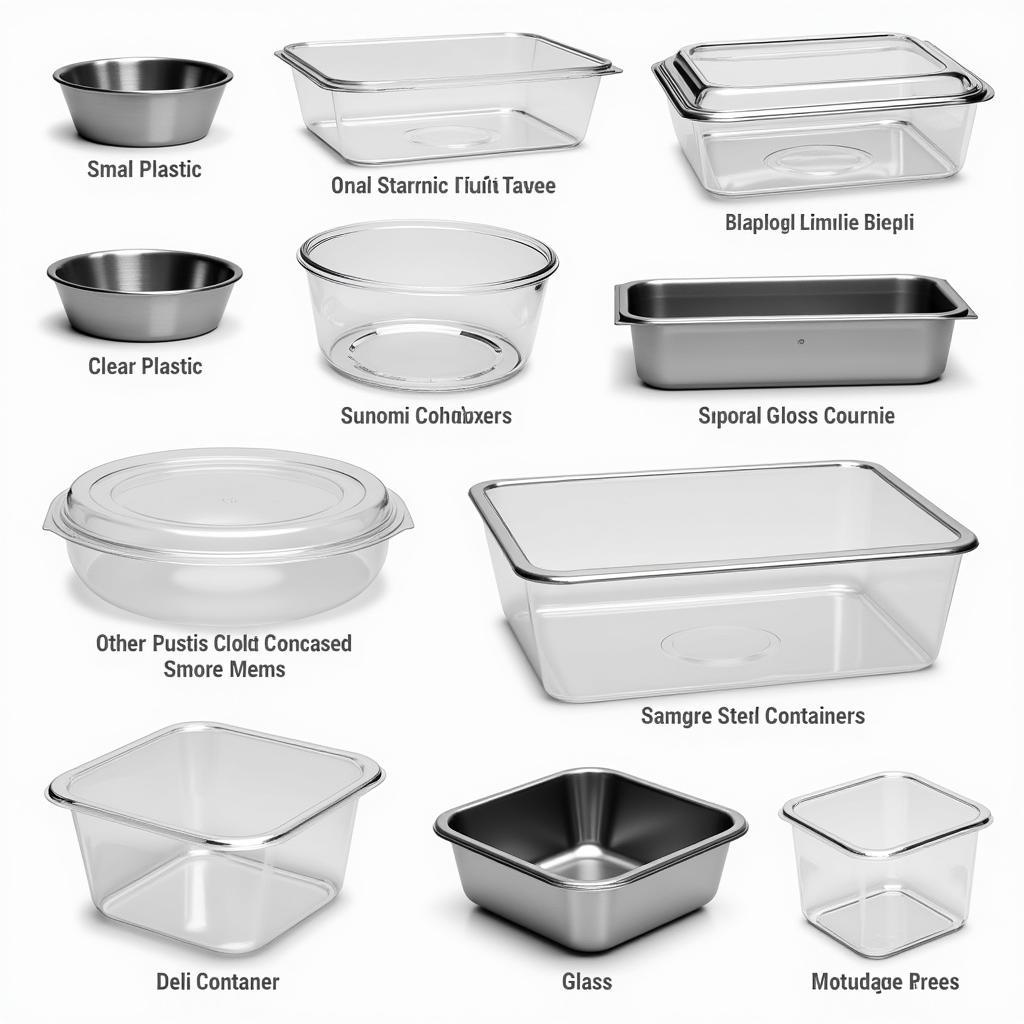Food Storage Containers Restaurant are essential for maintaining food quality, minimizing waste, and ensuring efficient operations. From prepping ingredients to storing leftovers, the right containers can make all the difference. This guide explores everything you need to know about choosing and using food storage containers in a restaurant setting.
Choosing the Right Food Storage Containers for Your Restaurant
Selecting appropriate food storage containers is crucial for food safety and optimizing your kitchen workflow. Several factors influence the best choice for your needs, including material, size, shape, and intended use. Let’s break down these key considerations:
Material Matters: Durability and Food Safety
 Different Types of Restaurant Food Storage Containers
Different Types of Restaurant Food Storage Containers
- Polycarbonate: Known for its durability and shatter-resistance, polycarbonate is a popular choice for busy restaurant kitchens. It can withstand extreme temperatures, making it suitable for both freezers and microwaves.
- Polypropylene: Another durable plastic option, polypropylene is lightweight and resistant to chemicals, making it ideal for storing a variety of food items. However, it’s less heat-resistant than polycarbonate.
- Stainless Steel: For ultimate durability and temperature resistance, stainless steel containers are an excellent investment. They are also non-reactive with acidic foods and easy to clean.
- Glass: Glass containers are a great option for storing dry goods and prepped ingredients. They are non-porous and odor-resistant, preserving the flavor of your food.
Size and Shape: Optimizing Storage Space
From small deli cups to large ingredient bins, selecting the right size and shape is essential for maximizing storage space and ensuring easy access. Consider square or rectangular containers for optimal space utilization in refrigerators and freezers. Round containers can be practical for soups and sauces.
Usage: Prepping, Storing, and Transporting
restaurant food storage container
Different food storage containers are designed for different purposes. Some are ideal for prepping ingredients, while others are better suited for storing leftovers or transporting food. Ensure your containers are fit for their intended use.
Food Storage Best Practices for Restaurants
Beyond choosing the right containers, implementing proper food storage practices is essential for maintaining food safety and quality.
Labeling and Rotation: First In, First Out (FIFO)
Clearly label all food storage containers with the contents and date. Implement a FIFO system to ensure that older ingredients are used before newer ones, minimizing food waste and maximizing freshness.
Temperature Control: Maintaining Optimal Conditions
Ensure that your refrigerators and freezers are set to the correct temperatures. Store different food types appropriately to prevent cross-contamination.
Cleaning and Sanitizing: Preventing Bacterial Growth
Regularly clean and sanitize your food storage containers to prevent bacterial growth and maintain food safety.
## Food Storage Container Maintenance and Care
Proper maintenance is key to extending the lifespan of your food storage containers and ensuring they remain hygienic.
Cleaning Tips and Tricks
While most restaurant plastic food boxes disposable are designed for single-use, reusable containers necessitate proper cleaning. Avoid abrasive cleaners that can scratch surfaces, and opt for gentle detergents.
Addressing Wear and Tear
Regularly inspect your containers for any signs of wear and tear, such as cracks or chips. Damaged containers should be replaced immediately to prevent food contamination and maintain food safety standards. If you require bulk purchases consider ordering food by the pallet for cost savings.
Investing in Quality Containers: A Long-Term Strategy
food grade bins are a great investment for bulk storage. While the initial cost might be higher, investing in high-quality, durable food storage containers can save you money in the long run by reducing the need for frequent replacements.
Conclusion
Choosing the right food storage containers restaurant is essential for efficient operations and maintaining food safety. By considering the material, size, shape, and intended use, you can ensure your kitchen is well-equipped to handle the demands of a busy restaurant. Investing in quality containers and implementing proper storage practices will ultimately save you time, money, and ensure the highest quality food for your customers.
FAQ
- What are the best materials for restaurant food storage containers?
- How do I choose the right size food storage container?
- What is FIFO and why is it important?
- How often should I clean and sanitize food storage containers?
- Where can I buy high-quality food storage containers for my restaurant?
Additional Help
For further assistance, please contact us at Phone: 02437655121, Email: minacones@gmail.com or visit us at 3PGH+8R9, ĐT70A, thôn Trung, Bắc Từ Liêm, Hà Nội, Việt Nam. We have a 24/7 customer service team.